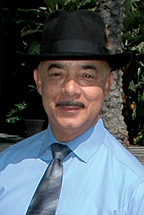Overachieving Undergrads
McNair Scholars prepare for advanced degrees through research projects
January 3, 2008
By Debra Cano Ramos
For Michele Gomez, graduate school is within reach. She will be the first in her family to earn a bachelor’s degree and the first to pursue a doctoral degree, thanks to her experience as a McNair Scholar.
The business administration major, with minors in Spanish and anthropology, plans to earn a doctorate in medical anthropology.
“I’m interested in researching the effects of sickness and disease on the family, cultural perceptions of disease, medicine, death and dying, Eastern versus Western medicine and cultural healing practices,” Gomez said.
Gomez, who will apply to graduate programs next fall at institutions such as Arizona State, Johns Hopkins and Harvard University, is quick to credit CSUF’s Ronald E. McNair Post-Baccalaureate AchievementProgram for giving her a shot at graduate school.
The federally-funded program,
established by the U.S. Department of Education in 1986, is named for
astronaut and Challenger space shuttle crewmember Ronald E. McNair, the
second African American to fly in space. Over the last five years, the
U.S. Department of Education has awarded Cal State Fullerton about $1
million in grants in support of the program, which provides low-income
and first-generation college students opportunities to seek advanced
degrees. Those selected as scholars come from a variety of disciplines
and each is paired with a faculty member who mentors them through their
research projects.
“Being selected as a McNair Scholar has been such a blessing in
my life.
It has exposed me to so many different avenues of education,” said Gomez, who expects to earn her bachelor’s degree in spring 2009. “The McNair Program is helping me achieve my educational goals by giving me the necessary tools to become a great candidate for graduate school, as well as a successful graduate student.”
Since 1999, Cal State Fullerton’s McNair Program has given promising students like Gomez the resources and guidance necessary to prepare them for post-baccalaureate work.
“We give them a focus, along with support and nurturing, to take their talents to the next level — to go on to graduate school and be successful,” said Gerald Bryant, director of CSUF’s McNair Program.
What sets the program apart from others is that it gives students the opportunity to conduct and hone academic research skills. Students get the opportunity to work side-by-side with faculty members, conducting research.
“The primary purpose is to get students to understand the research process,” Bryant said. “We know when students get into graduate school, if they don’t understand the research process, they get overwhelmed. I’m convinced that every student, starting in their freshman year, should be exposed to research because the experience will give them a fluid entrée into graduate school.”
As seniors graduate, new McNair Scholars are chosen with 22 students in the program each academic year. Students must have 59 units and at least a 3.0 grade point average to apply.
Scholars receive a stipend, plus the program
helps to build their GPA and boost research skills to help them be competitive
in applying for graduate school, Bryant said. Scholars also get the opportunity
to present research at professional conferences and some even get their
work published in journals. In addition, Scholars have the chance to
visit graduate schools in the summer, where they gain insight into applying
for advanced
degree programs and what will be expected of them.
To date, 107 students have completed the program and graduates have gone on to advanced studies at top-tier institutions across the country and abroad.
“It is a delight to mentor McNair scholars as they are so motivated and dedicated,” said Melinda Blackman, associate professor of psychology who served as a mentor and “sounding board” for Gomez’s research ideas and hypotheses. “The McNair scholar program has done an outstanding job of identifying future researchers and launching their careers.”
The program is overseen by an advisory board, which is comprised of faculty members, assistant deans and business leaders.
“The one major benefit is when these students come back to campus in the fall, they are more focused and have a sense of urgency about doing what is needed to get accepted and be a solid candidate in the programs they apply to,” Bryant said.

